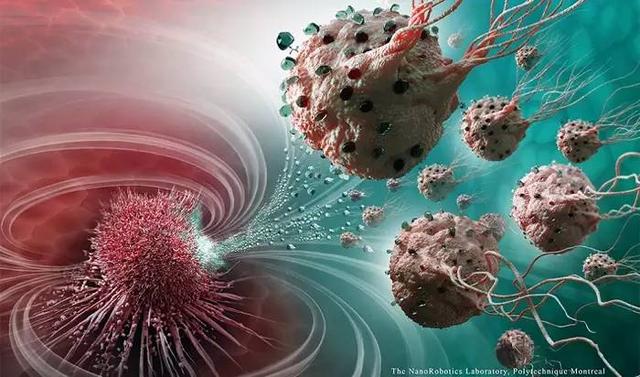According to the US "Physicists' Organization Network, a research team composed of scientists from the Montreal Polytechnic University, the University of Montreal and McGill University in Canada has recently achieved a great breakthrough in the field of cancer research. They have developed a nano-robot reagent that can be precisely targeted for tumor-active cancer cells via blood. This new nano-robot reagent can shuttle through the bloodstream, targeting tumor-active cancer cells, allowing the drug to reach the cancer accurately. Lesion.
This groundbreaking research has just been published in an article on the website of Nature Nanotechnology, entitled "Magnetic anaerobic bacteria feeding drug-containing nanoliposomes into tumor-deficient areas." The article pointed out that the results of the study conducted by the mouse model showed that the nano-robot reagent successfully delivered the drug to colorectal tumor lesions. A large number of nano-robot reagents are actually composed of bacteria with more than 100 million flagella, so they are propelled in a completely autonomous way, and the drug-carrying drugs can be moved from the injection point to the lesions that need to be treated by the body. . This approach ensures that the injectable drug is optimally localized to the tumor to avoid endangering the integrity of the organ and surrounding healthy tissue. Therefore, the dose of the drug that is highly toxic to the human body can be significantly reduced.
Sylvan Martel, the head of the research team, claims: "The innovative application of this nano-transporter not only affects the creation of more advanced engineering concepts and the original interventions, but also for therapeutic agents, imaging reagents. And the manufacture of new vehicles for diagnostic reagents opens the door to convenience,†Martel added. “The chemotherapy is toxic to the entire body. Chemotherapy can also use these natural nano-robots to transport drugs directly to the target area, eliminating harmful side effects. At the same time improve its therapeutic effect."

In recent years, the research and development of medical nano-robots has achieved many gratifying results. For example, in July 2012 scientists at the University of Florida developed a nanorobot capable of killing hepatitis C virus 100%. In addition, in December 2013, scientists at Jeonnam University in South Korea developed nanobots that can diagnose and treat high-grade cancers such as colorectal cancer, breast cancer, stomach cancer, and liver cancer. In another example, in April 2014, researchers at the Bayland University in Israel succeeded in using the DNA strand to create a medical nano-robot capable of performing logical operations in a moving object in accordance with programmed procedures. In another example, in July 2016, scientists at the Federal Institute of Technology in Lausanne, Switzerland, developed nanobots that deliver drugs to specific locations or for precise operations.
So far, medical nano-robot technology is still in the research and development stage, and some technical obstacles remain to be solved. From the current stage, due to the industrial level, nano-robots have research bottlenecks in terms of drive, control, and sensor feedback. Despite this, many scientists, engineers and doctors believe that nano-robots are likely to bring about a medical revolution in the foreseeable future. This “in-vivo doctor†will treat cancer, remove blood clots, clean wounds, treat gout, crush stones, Correcting DNA errors, precise site-specific administration, and acting as an immune system unleash enormous potential. Not long ago, American engineer and futurist Raymond Kozwell also proposed a more daring idea: by 2030, nano-robots will be able to enter the human brain in a non-invasive way, connected to our new cortex, just like Like cloud computing, humans will become longer, smarter and more humorous.
Urinary and Reproductive System
silicone foley catheter,foley catheter with temperature sensor,hsg catheter,cervical ripening balloon
Anesthesia Medical Co., Ltd. , https://www.trustfulmedical.com